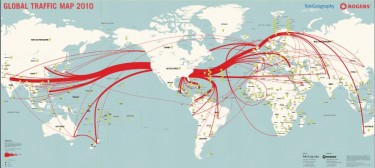Since its infancy, the Internet has benefited from a lightweight and decentralized approach to governance—a combination of targeted government regulation, technical coordination by companies, and a number of formal and informal multistakeholder organizations to help guide the Internet’s development, such as the IETF, W3C, and the IGF, just to name a few.
Typically, these multistakeholder organizations include technologists, academic experts, and civil society representatives, as well as governments and corporate voices. They have historically operated using principles of openness, transparency, inclusiveness, and consensus. This framework has given users in most countries considerable freedom to innovate, participate, and build out the network on their own terms. In other words, it has created and supported the open, decentralized, and global Internet as we know it.
But this framework is not set in stone. This December, the International Telecommunication Union, a government-centric UN treaty body, will decide whether and how it might regulate policy and technical standards for the global Internet in the future. Until now, the ITU has been dedicated to setting technical standards for interoperability of international telecommunications, radio, and satellite systems, in addition to promoting access to ICT. However, some member states have expressed interest in expanding the ITU’s mandate to cover Internet-related technical and policy matters.
The emergence of the ITU as a regulatory body for the Internet would shift authority away from the decentralized, multistakeholder approach that has served the Internet since its inception, and make Internet regulation a more centralized and less inclusive process.
A diverse group of civil society organizations and academics in Argentina, Brazil, Canada, Chile, Egypt, the EU, India, Kenya, Pakistan, the US and beyond have come together to request, in the form of an open letter, more transparency from the ITU and its Member States as it considers proposals that could give it power to regulate the Internet. This request is grounded in commitments of the World Summit on Information Society (a conference organized by the ITU) to build a people-centered, inclusive, and development-oriented information society. Summit commitments require international organizations to ensure meaningful participation of all stakeholders, particularly from developing countries, in the regulation and management of the global ICT environment.
The letter states:
The continued success of the information society depends on the full, equal, and meaningful participation of civil society stakeholders (along side the private sector, the academic and technical community, and governments)…such participation depends on transparency and openness of process at every stage of substantive and procedural dialogue.
The letter asks ITU leaders and Member States to remove restrictions on the sharing of documents related to the treaty process and to open the process to meaningful civil society participation by “providing formal speaking opportunities and according civil society views an equal weight as those of other stakeholders.” It encourages Member States to “open public processes at the national level to solicit input on proposed amendments to the treaty from all relevant stakeholders, including civil society, and release individual proposals for public debate.”
When governments regulate the Internet without input from civil society, and academic and technical experts, the resulting policies are more likely to place undue limitations on users’ rights to free expression, freedom of information, and privacy.
While advocates often focus on extreme cases such as surveillance practices in Syria and filtering policies in China, ACTA in Europe and SOPA in the US also provide strong examples of policies that were formulated with little or no participation by civil society. Particularly in 2012, we have also seen that Internet users and concerned citizens are eager to participate in public debate about how the Internet should be regulated. At their core, the information society – and the Internet – are people-centered, and citizens have a clear stake where regulation could impact their rights to freedom of expression, freedom of information, and privacy.
The emergence of the ITU as a regulatory body for the Internet would represent a sea change in Internet governance at the global level. The negotiations in December could lead to unintended consequences, especially if not all stakeholders are allowed input into the process – new regulations could undermine the success of the Internet as a platform for innovation, economic growth, human development and democratic participation.
Civil society organizations and academics are invited to join this call to address deficiencies in the ITU treaty process. The letter has been posted on various civil society organization websites. The Center for Democracy & Technology (CDT) has posted the letter in English, along with an up-to-date list of signatories, and information on how to sign the letter. Chilean NGO Derechos Digitales has posted the letter in Spanish. This post will be updated as translations in other languages become available.
This post was co-authored by Ellery Biddle and Cynthia Wong, Director of CDT's Project on Global Internet Freedom.





3 comments